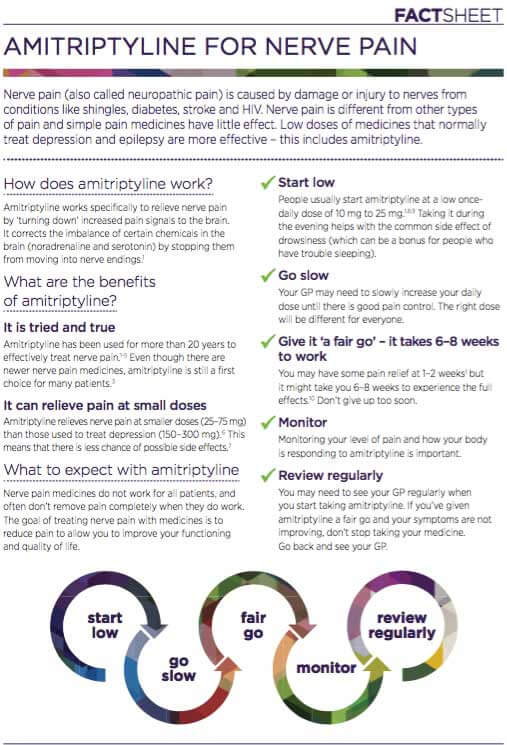If you're a frequent visitor to Healthify, why not share our site with a friend? Don't forget you can also browse Healthify without using your phone data.
Amitriptyline
Sounds like 'A-mee-trip-ti-leen'
Key points about amitriptyline
- Amitriptyline is used to treat nerve pain, prevent migraine headaches and less commonly, depression.
- It belongs to a group of medicines known as tricyclic antidepressants (TCAs).
- Find out how to take it safely and possible side effects.

Amitriptyline has many uses. It's used to treat certain kinds of nerve pain (such as neuropathic pain, peripheral neuropathy, postherpetic neuralgia) and prevent migraine headaches.
Amitriptyline belongs to a group of medicines called tricyclic antidepressants (TCAs). In the past, these medicines were commonly used for depression, but newer medicines are now available. TCAs are sometimes still used for severe depression or when other antidepressants are unsuitable.
Read more about antidepressants.
In Aotearoa New Zealand amitriptyline is available as tablets in different strengths – 10 mg, 25 mg and 50 mg.
- Always take your amitriptyline exactly as your healthcare provider has told you. The pharmacy label on your medicine will tell you how much amitriptyline to take, how often to take it, and any special instructions.
- The dose of amitriptyline will be different for different people and depends on what you're taking it for.
- Your healthcare provider will usually start you on a low dose and increase this slowly. This allows your body to get used to the medicine and reduces side effects.
- Amitriptyline is usually prescribed as a single dose to be taken at bedtime, although your dose may be different.
- If your tablets look different to your last supply, ask your healthcare provider for advice.
- Timing: Take amitriptyline at the same times each day. It's usually taken as a single dose at bedtime, but your dose may be different. Swallow your amitriptyline tablets with a glass of water.
- Food: You can take amitriptyline with or without food.
- Missed dose: If you forget to take your dose, take it as soon as you remember that day. But if it's nearly time for your next dose, just take the next dose at the usual time. Don't take double the dose.
Here are some things to know when you're taking amitriptyline. Other things may be important as well, so ask your healthcare provider what you should know about.
- Alcohol: Avoid or limit alcohol while you're taking amitriptyline. Drinking alcohol can increase side effects of feeling sleepy, putting you at risk of falls and other accidents. This is especially when you first start treatment. If you do drink alcohol, drink only small amounts until you know how this affects you while you're taking amitriptyline.
- Driving: Be careful when driving or using tools until you know how this medicine affects you.
- The effects of amitriptyline are not immediate: It may take a few weeks before you notice the full benefits.
- Don’t stop taking amitriptyline suddenly: Talk to your healthcare provider before stopping. The dose is usually gradually reduced to avoid side effects.
- Diabetes: If you have diabetes, you may need to check your blood glucose more often because amitriptyline can affect your levels.
- Sun protection: Amitriptyline can make your skin more sensitive to the sun. You may get a burning, tingling feeling on your skin when you are in the sun, or you may notice a darker tan or redness. When you're outside, protect your skin by using an SPF30+ sunscreen and clothing that protects you from the sun. Let your doctor know if you notice a rash when you first start taking amitriptyline. This could be an allergic reaction.
- Other medicines: Amitriptyline interacts with many other medicines, herbal supplements (such as St. John's Wort) and rongoā Māori so check with your healthcare provider before starting amitriptyline or before starting any new medicines.
Like all medicines, amitriptyline can cause side effects, although not everyone gets them. Often side effects improve as your body gets used to the new medicine.
Suicidal behaviour
The use of antidepressants has been linked with self-harm or suicidal thoughts and behaviour. Children, teenagers, young adults and people with a history of suicidal behaviour are most at risk. This is most likely during the first few weeks of starting treatment or if the dose is changed. It's important to look out for signs of suicidal behaviour such as suicidal thoughts, self-harm, worsening of low mood, agitation or aggression.
If you notice any of these signs, contact your doctor immediately. If you need urgent help or are concerned, phone:
- Lifeline 0800 543 354 (available 24 hours a day), or
- Healthline 0800 611 116, who can give you the phone number for your local mental health crisis line.
Other side effects
| Side effects | What should I do? |
|---|---|
|
|
|
|
|
|
|
|
|
|
|
|
Read more about medicines and side effects and reporting a reaction you think might be a side effect.
The following links have more information on amitriptyline. Be aware that websites from other countries may contain information that differs from New Zealand recommendations.
Arrow-Amitriptyline(external link) Medsafe Consumer Information Sheet, NZ
Amitriptyline(external link) NZ Formulary Patient Information
Helping patients with neuropathic pain NPS MedicineWise [PDF, 168 KB] NPS MedicineWise, Australia
Amitriptyline for nerve pain(external link) NPS MedicineWise, Australia
Stopping antidepressants: be cautious and go slow(external link) Medsafe, NZ
References
- Amitriptyline hydrochloride(external link) NZ Formulary
- Diagnosing and managing headache in adults in primary care(external link) BPAC, NZ, 2017
- The role of medicines in the management of depression in primary care(external link) BPAC, NZ, 2021
- Anticholinergic burden in older people(external link) BPAC, NZ, 2024
Brochures

NPS MedicineWise, Australia, 2021

Medicines and side effects
Healthify He Puna Waiora, NZ, 2024

Health Quality and Safety Commission, NZ, 2019
EnglishTe reo Māori
Credits: Sandra Ponen, Pharmacist, Healthify He Puna Waiora. Healthify is brought to you by Health Navigator Charitable Trust.
Reviewed by: Stephanie Yee, Pharmacist, Auckland
Last reviewed:





